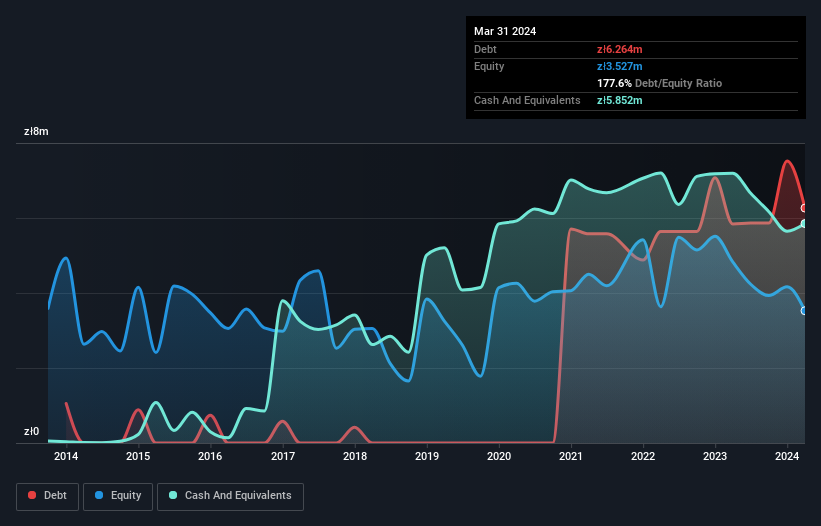
Warren Buffett famously said, 'Volatility is far from synonymous with risk.' When we think about how risky a company is, we always like to look at its use of debt, since debt overload can lead to ruin. We note that Read-Gene S.A. (WSE:RDG) does have debt on its balance sheet. But is this debt a concern to shareholders?
When Is Debt A Problem?
Debt assists a business until the business has trouble paying it off, either with new capital or with free cash flow. If things get really bad, the lenders can take control of the business. While that is not too common, we often do see indebted companies permanently diluting shareholders because lenders force them to raise capital at a distressed price. Of course, the upside of debt is that it often represents cheap capital, especially when it replaces dilution in a company with the ability to reinvest at high rates of return. When we think about a company's use of debt, we first look at cash and debt together.
Check out our latest analysis for Read-Gene
How Much Debt Does Read-Gene Carry?
As you can see below, at the end of March 2024, Read-Gene had zł6.26m of debt, up from zł5.84m a year ago. Click the image for more detail. However, it does have zł5.85m in cash offsetting this, leading to net debt of about zł412.0k.

How Healthy Is Read-Gene's Balance Sheet?
We can see from the most recent balance sheet that Read-Gene had liabilities of zł711.5k falling due within a year, and liabilities of zł9.65m due beyond that. Offsetting this, it had zł5.85m in cash and zł1.33m in receivables that were due within 12 months. So its liabilities total zł3.18m more than the combination of its cash and short-term receivables.
Given Read-Gene has a market capitalization of zł54.9m, it's hard to believe these liabilities pose much threat. Having said that, it's clear that we should continue to monitor its balance sheet, lest it change for the worse. Carrying virtually no net debt, Read-Gene has a very light debt load indeed. When analysing debt levels, the balance sheet is the obvious place to start. But it is Read-Gene's earnings that will influence how the balance sheet holds up in the future. So if you're keen to discover more about its earnings, it might be worth checking out this graph of its long term earnings trend.
In the last year Read-Gene wasn't profitable at an EBIT level, but managed to grow its revenue by 38%, to zł11m. With any luck the company will be able to grow its way to profitability.
Caveat Emptor
Even though Read-Gene managed to grow its top line quite deftly, the cold hard truth is that it is losing money on the EBIT line. To be specific the EBIT loss came in at zł1.6m. Considering that alongside the liabilities mentioned above does not give us much confidence that company should be using so much debt. So we think its balance sheet is a little strained, though not beyond repair. Another cause for caution is that is bled zł1.3m in negative free cash flow over the last twelve months. So suffice it to say we do consider the stock to be risky. There's no doubt that we learn most about debt from the balance sheet. However, not all investment risk resides within the balance sheet - far from it. These risks can be hard to spot. Every company has them, and we've spotted 3 warning signs for Read-Gene (of which 1 shouldn't be ignored!) you should know about.
Of course, if you're the type of investor who prefers buying stocks without the burden of debt, then don't hesitate to discover our exclusive list of net cash growth stocks, today.
New: AI Stock Screener & Alerts
Our new AI Stock Screener scans the market every day to uncover opportunities.
• Dividend Powerhouses (3%+ Yield)
• Undervalued Small Caps with Insider Buying
• High growth Tech and AI Companies
Or build your own from over 50 metrics.
Have feedback on this article? Concerned about the content? Get in touch with us directly. Alternatively, email editorial-team (at) simplywallst.com.
This article by Simply Wall St is general in nature. We provide commentary based on historical data and analyst forecasts only using an unbiased methodology and our articles are not intended to be financial advice. It does not constitute a recommendation to buy or sell any stock, and does not take account of your objectives, or your financial situation. We aim to bring you long-term focused analysis driven by fundamental data. Note that our analysis may not factor in the latest price-sensitive company announcements or qualitative material. Simply Wall St has no position in any stocks mentioned.
Have feedback on this article? Concerned about the content? Get in touch with us directly. Alternatively, email editorial-team@simplywallst.com
About WSE:RDG
Read-Gene
Engages in the detection, prevention, and treatment of various types of cancer.
Mediocre balance sheet low.
Market Insights
Community Narratives




